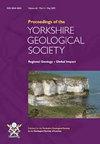Palynology of the Lower Cretaceous Hundleby Clay Member of the Claxby Ironstone Formation in eastern England and its biostratigraphic and palaeoenvironmental significance
IF 0.6
4区 地球科学
Q4 GEOLOGY
引用次数: 1
Abstract
Palynomorph assemblages recovered from five samples of the Hundleby Clay Member of the Claxby Ironstone Formation contain abundant dinoflagellate cysts and miospores (spores and pollen grains). The cyst assemblages are sufficiently diverse to enable an age determination of early Valanginian for all five samples, although it is possible that evidence from the highest two samples indicates a younger age, but no younger than earliest Hauterivian. The miospore assemblage is consistent with these suggestions. A close comparison can be made with palynomorph assemblages from the Speeton Clay Formation at outcrop in East Yorkshire, and indicates a possible correlation with Beds D4–D3 ( Paratollia – Polyptychites ammonite zones), supporting the age determination. The overall composition of the palynological matter recovered from each sample, i.e. their palynofacies, suggests that the whole of the sedimentary succession accumulated in a nearshore marine setting, with deposits at the base of the exposure (samples 1 and 2) reflecting a more distal shelf environment than those from higher up and at the top of the section examined (samples 4, 5 and 3).英国东部克拉斯比铁矿组下白垩统Hundleby粘土段孢粉学及其生物地层学和古环境意义
从5个Claxby铁石组Hundleby粘土段样品中发现的孢芽组合含有丰富的鞭毛囊和微孢子(孢子和花粉粒)。囊肿组合的多样性足以确定所有五个样本的早期瓦兰吉尼亚人的年龄,尽管最高的两个样本的证据可能表明年龄更年轻,但并不比最早的Hauterivian更年轻。小孢子组合与这些建议一致。与东约克郡露头Speeton粘土组的孢粉岩组合进行了密切比较,表明其可能与D4-D3层(Paratollia - polytychites菊石带)相关,支持了年龄的确定。从每个样品中恢复的孢粉物质的整体组成,即它们的孢粉相,表明整个沉积序列积聚在近岸海洋环境中,暴露下部(样品1和2)的沉积物反映了远端陆架环境,而在检查的剖面较高和顶部(样品4、5和3)的沉积物则反映了远端陆架环境。
本文章由计算机程序翻译,如有差异,请以英文原文为准。
求助全文
约1分钟内获得全文
求助全文
来源期刊
CiteScore
2.00
自引率
30.00%
发文量
7
审稿时长
>12 weeks
期刊介绍:
The Proceedings of the Yorkshire Geological Society (PYGS) has been published without a break since 1839. It is one of the leading journals of British geology. Each year two parts are issued containing original research papers on all aspects of geology. Traditionally the Proceedings has given particular attention to the geology of northern England and its neighbouring areas. The submission of papers on related topics but of a more general interest is encouraged. All papers are subjected to the full scrutiny of two independent referees.

 求助内容:
求助内容: 应助结果提醒方式:
应助结果提醒方式:


